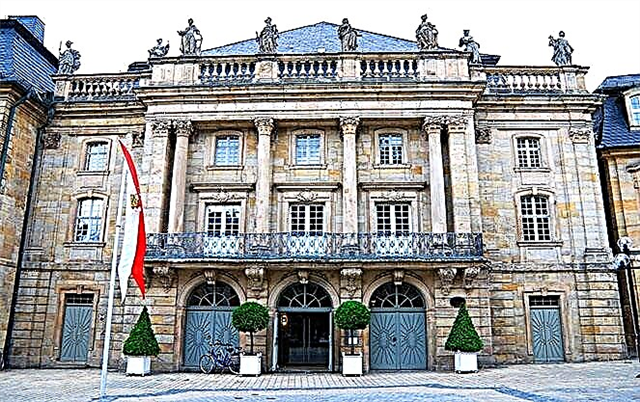Getting higher education in Germany is considered very prestigious, so in 2021 you can meet students from different countries of Europe, Asia, Africa and America in Berlin. Berlin universities attract them with a variety of specialties, a high level of teaching, as well as the authority of the diplomas they receive and their recognition by the leading companies of the world community.

How the education system works in Germany
The German education system is quite complex and has its own characteristics. As in other European countries, it includes four main stages: pre-school education, primary, secondary and high school. Higher education in Germany is based on the Bologna process, which implies two levels of student training: bachelor's and master's degrees. Those who would like to gain in-depth knowledge in certain disciplines and further engage in science go to the master's program.
Education in public universities in Germany is free - you only have to pay a student fee, the amount of which in various educational institutions ranges from 100 to 500 euros per semester.
General information about Berlin universities
Studying in Berlin is popular because it has a number of advantages:
- there are several dozen universities, institutes and higher schools offering education in various specialties;
- the best teaching and research forces of the country are concentrated in metropolitan universities;
- developed infrastructure, excellent transport interchanges, the presence of museums, theaters, entertainment and sports centers, cafes and shops allows students to combine comfortable learning with a variety of leisure activities;
- relatively low cost of living - living in the German capital is several times cheaper than in London, Paris or New York.
Capital state universities
Berlin is called the city of students. There are more than three dozen higher educational institutions here, in which, according to various sources, about 175 thousand students study. The state finances four major universities, seven universities, three art schools, as well as an international Business School.
FU: Free University of Berlin
The Free University (Freie Universität Berlin) is the largest university in Germany, which is rightfully proud of its graduates: famous politicians, public figures, scientists. And his philological library is known all over the world.

Undergraduate studies are conducted in 40 specialties: computer science and information technology, language specializations, philology, law, art history, biochemistry, medical specialties, pharmaceuticals, veterinary medicine and others. There are more than 20 English-language programs for masters.
TU Berlin: Technical University of Berlin
Traces its history from the mining academy, founded in the 18th century, and today it is recognized as the best technical university in Germany and Europe. The main areas of research specialization: energy, cyber-physical systems, ecology, rational use of natural resources, design, technology of new materials. For more information, visit the official website of the Technical University of Berlin.
The Technical University takes part in 120 international projects. Its graduates are known all over the world. The university has a summer camp for students, where you can take German language courses.
HU: University. Humboldt
It is one of the oldest and most reputable universities in Germany. He is known for his achievements in the field of medicine, law, humanities and natural sciences, art studies, and innovative developments. 29 of its alumni and teachers became Nobel laureates. Otto Bismarck, Karl Max, Max Born, Heinrich Heine, Arthur Schopenhauer studied here.
Today the University. Humboldt offers 189 study programs and the opportunity to acquire almost any specialty.
Berlin School of Economics and Law
The School of Economics and Law (Berlin School of Economics and Law BSEL) received its current name and university status in 2009 after the merger of the Berlin School of Economics and FHVR Berlin.
In terms of the number of graduates, it is one of the largest public higher education institutions of its kind in Germany, providing education in business and management in 36 specialties and 8 MBA (International Business Administration) programs.
In particular, the bachelor's degree studies international economics and organization of production, business management. The master's program offers over 20 programs: finance and credit, economics, consulting, management and administration.
Private universities in Berlin
In Germany, there are more than 100 private higher education institutions accredited by the Ministry of Education of the Federal Republic of Germany, which offer training in almost any direction. Moreover, 17 of them are located in the German capital. Private universities place an emphasis on specialized practical training of future specialists at the highest level.
SHB: Steinbeis University
The Steinbeis Hochschule Berlin (SHB) is a private university that offers bachelor's degree programs in the humanities, business administration and master's degrees in the same specialties, as well as business and engineering.

The private European School of Management and Technology, Design Akademie Berlin and other universities are also popular. For example, at the Academy of Design, students studying marketing, the art of advertising and design (graphics and the web) can get a bachelor's degree and even a master's degree. And in the international private business school of management and technology, training is conducted according to the MBA, Executive MBA, and Executive Education programs.
Institutes of Applied Sciences
Universities or institutes of applied sciences (Fachhochschule) are a type of higher education institution focused on vocational education.
HTW: Berlin University of Applied Sciences and Engineering
Hochschule für Technik und Wirtschaft Berlin (HTW) is one of the largest public universities in this field in East Germany. About 13 thousand students study here, who study engineering sciences, the basics of design, economics, computer science and game design. The main research is carried out in the field of energy efficiency, modern production technologies, industrial design, digital technology.
IUBH: International University of Applied Sciences Bad Honnef
The Internationale Hochschule Bad Honnef (IUBH) is one of the best private universities in Germany and a leader in service management training programs. Specialties: international management (hotels), finance and credit, transport and logistics, IT management, healthcare, personnel policy, aviation, marketing.
This university was the first to introduce teaching in English for students of all specialties. As a result, the overwhelming majority of university graduates now work for large international companies.
The university has a campus in Berlin, which is located in the heart of the German capital, close to famous attractions such as Alexanderplatz and Museum Island (Museumsinsel). The campus is located in a beautiful historical building, which is located next to the Prussian Academy of Sciences - it can be clearly seen in the photo of the Academy of Sciences.
Art institutes
Foreigners wishing to get an education in the field of art can opt for one of the art or music universities in Germany. The main areas of study in them are painting and graphics, artistic and applied design, sculpture, vocals, composition and conducting.Some universities train architects, decorators, restorers, designers for the media, directors of musical theater, choreographers.
Berlin University of the Arts
Universität der Künste Berlin for over 300 years. Its four faculties study drawing and painting, performing arts and music, design and architecture. In total, the university offers 40 study programs.

Various concerts, exhibitions, lectures, art projects are often held here, premises for which are provided by the Berlin Academy of Arts.
Berlin Eisler School of Music
Hochschule für Musik "Hanns Eisler" Berlin is a state music university, which is akin to a conservatory. Here, performers on various musical instruments are trained and improve their skills. The university has a department for directing musical theaters, a special music school for gifted children.
Church institutions
Speaking about the universities of Berlin, one cannot fail to mention the church educational institutions. This list includes:
- Berlin institution of higher education for social work and education (Evangelische Fachhochschule Berlin): www.evfh-berlin.de. This is a private confessional university.
- Berlin Catholic Higher School KFB (Katholische Hochschule für Sozialwesen Berlin): www.khsb-berlin.de. Private confessional higher educational institution.
You can find out the approximate cost of training in the best universities in Berlin by looking at the table:
| University name, website | Bachelor's Degree Cost | Cost of Master's Degree | Stud. contribution / sem | Language of instruction |
|---|---|---|---|---|
| Berlin University of Applied Sciences HTW https://www.htw-berlin.de/ | Is free | Is free | Semester fee 200 euros | German, English |
| International University of Applied Sciences Bad Honnef, Berlin (IUBH) https://www.iubh.de/en/campus/berlin/ | No bachelor's degree, there is a preparatory program 2490 euros | 11700-14200 euro / year | Entry fee 800 euros Campus card € 300 | English |
| Free University of Berlin www.fu-berlin.de | Is free | Is free | Fee 290 euros / sem. bachelor's degree and 430 euros / sem. magistracy | German, English |
| Berlin Technical University https://www.tu-berlin.de/ | Is free | Is free | Fee 240 euros / sem. | German, English |
| University named after Humboldt https://www.hu-berlin.de/de | Is free | Is free | Fee 243 euros | German |
| Berlin School of Economics and Law https://www.hwr-berlin.de/ | Free, except MBA | MBA from 15,900 to 17,800 euros | German English | |
| Steinbeis University www.steinbeis-hochschule.de | 2800 euro / sem. | From 2800 euros / family | German | |
| Lomonosov school http://lomonossow-schule.de/ru/ | Depending on family income | From 150 to 500 euros | German, Russian | |
| University of the Arts www.kh-berlin.de | Free, on some specialties 750 euros / year | 3700-5500 Postgraduate studies euro / year | Fee 250 euro / sem | German, English |
| Eisler High School of Music www.hfm-berlin.de | Is free | Is free | Fee 250 euro / sem. | German |
What applicants need to remember
An applicant from Russia can enter a German university in two ways:
- having received a high school diploma, you must enter a special college at the university (studienkolleg), choosing the course that you intend to study further;
- you can enter a Russian university, study for a year or two on a full-time basis and apply to a German university with a request to enroll in the first year of the university in your specialty.
At the same time, knowledge of the German language is required at the C1 level.
Opportunities for Free Education, Scholarships and Grants
Education in public universities in Berlin, even for foreigners, is mostly free. There are admission fees and semester fees, but they are small. In private universities you will have to pay for your studies.
Scholarships and grants can also be received, but for this you need to collect a lot of papers, have good academic performance and meet the requirements that various funds impose on applicants.
Internships during the training period
In every German university, internship is a prerequisite for obtaining a profession, its duration is from 3 to 6 months. Its goals, objectives and content are stipulated by the curriculum, while the student himself is looking for a place to complete it, coordinating it with the head of the practice.

Some specialties (journalism, medicine, some technical specialties) require pre-educational practice lasting 3-12 weeks.
How students live in Berlin
It is believed that a student will need about 800 euros per month for a modest life. A room can be rented for 250-300 euros, an apartment for one - from 500 euros. Travel expenses are paid for with a student card. Many people ride bicycles.

Student life is perfectly organized: libraries, canteens, dormitories, sports sections, events, bonuses for student card holders when visiting exhibitions, concerts, and trips around the country.
Many students work part-time, while international students are entitled to full-time jobs for three months a year or for 6 months part-time.
Popular German universities
You can study in Germany not only in the capital - there are equally popular universities in other cities of the country:
- Munich Technical University Technical University Munich (Munich);
- Heidelberg University Heidelberg University (Heidelberg);
- Karlsruhe Institute of Technology Karlsruhe Institute of Technology (Karlsruhe).
Finally
Studying in Berlin is a great opportunity to get to know life in Germany, to master the German language perfectly, in order to subsequently get a decent job in one of the European companies and even citizenship in one of the EU countries.











